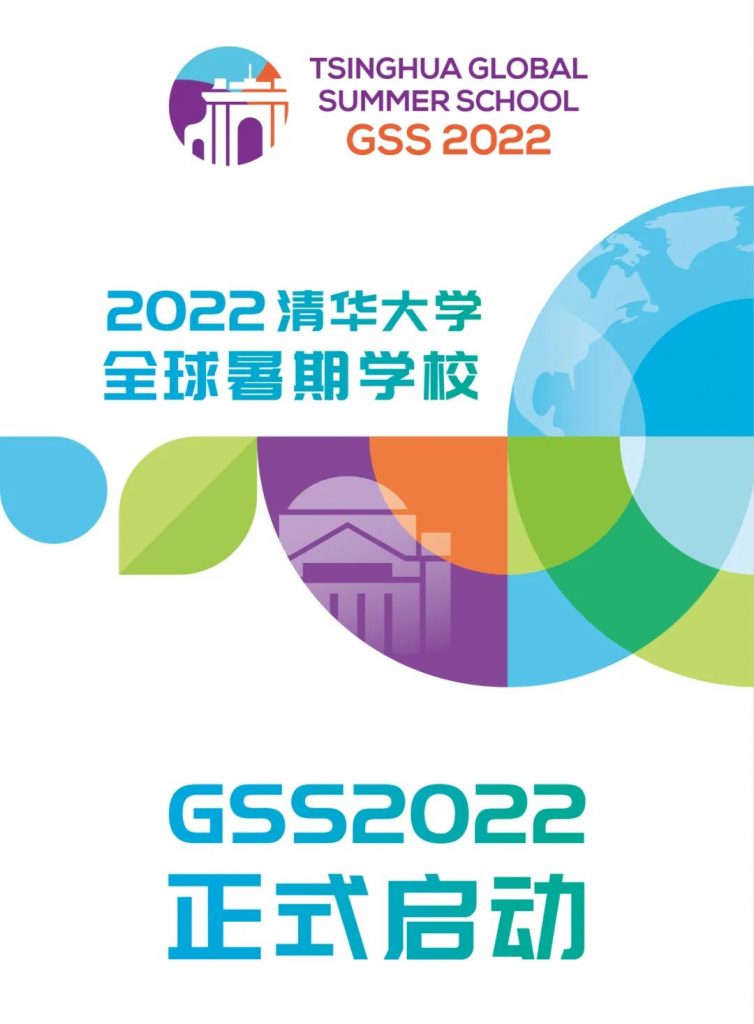The Global MOOC and Online Education Alliance will be hosting Hack9 (“Digital Transformation for a More Inclusive University Campus and Learning Environment”) of the Tsinghua University Global Summer School (GSS) 2022’s SDG Hackathon — a practice course aimed at cultivating student’s leadership, creativity, mobility, international competence, and teamwork skills.
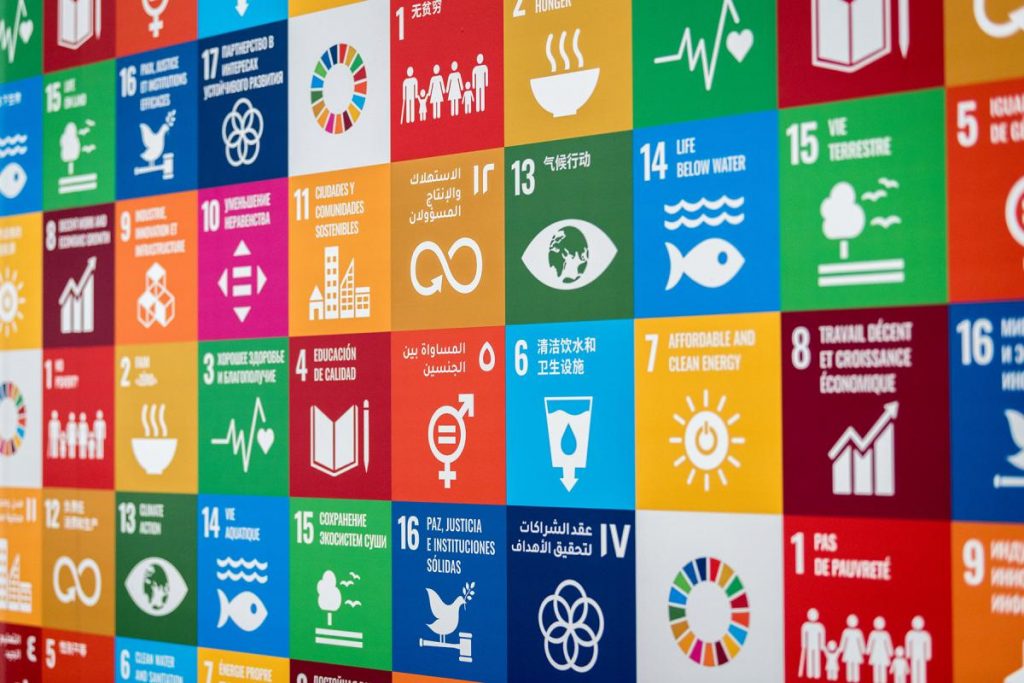
The SDG Hackathon has the 17 UN Sustainable Development Goals (SDG) in mind, designated as different themed sub-tracks, also known as hacks, to attract student innovators to participate.
There are no restrictions on grades, majors, or schools.
Students can freely choose challenging topics based on their interests, form interdisciplinary cross-cultural teams virtually, and develop innovative solutions. In the end, the solutions would be presented to the panel of judges. Outstanding teams will be then chosen to present their projects during the GSS closing ceremony.
At the SDG Hackathon, attendees will get the opportunity to network with some of the most forward-thinking students and academics from around the world, gain new perspectives, and be inspired by people from all walks of life. Tsinghua University and UNITAR (United Nations Institute for Training and Research) will also award participants with a certificate of participation. For reference and inspiration, last year’s GSS SDG Hackathon winning teams’ presentations can be found here: https://www.tsinghua.edu.cn/gss/info/1002/1311.htm
Tsinghua GSS 2022 SDG Hackathon schedule (Beijing time, GMT+8):
About Hack9 (“Digital Transformation for a More Inclusive University Campus and Learning Environment”)
- Hack9 organizer: Global MOOC and Online Education Alliance Secretariat at Tsinghua University
- Hack9 theme: “Digital Transformation for a More Inclusive University Campus and Learning Environment”
Inclusive education is a challenge for university systems. Among the United Nations Sustainable Development Goals (SDGs), Goal 4 “Ensure inclusive and equitable quality education and promote lifelong learning opportunities for all” is promoting a global 2030 agenda for the effective recognition of the rights of all people and the construction of a cohesive society that respects the principle of equal opportunities and non-discrimination.
When universities are identified with the principles of inclusion, diversity is valued, recognizing that there are different ways of learning and that all students bring things of value to the learning environment. In addition, it removes barriers linked to exclusionary practices and works proactively to respond to the needs of all learners. Inclusive practices can enrich the curriculum and the success of all students. Learning-centered approaches and Universal Design for Learning (UDL) have been shown to be effective in inclusive contexts. However, moves towards inclusion are taking place at different rates in different countries. Digital technology has considerable, but largely unused potential to support inclusive education of disabled people and other minority groups. In particular it can provide multiple means of presenting, representing and expressing learning and through assistive technology (AT) enable disabled learners to overcome barriers they would otherwise experience to participating in the curriculum. It also has the potential to increase enjoyment and motivation. Online education has potential to increase educational access too. Regardless, the major challenge remains that not all the initiatives consider the needs of disabled people.
- What are the often-ignored or unmet needs for university students with disabilities?
- How can digital technology help to promote quality learning experience for university students with special needs?
- How can we digitally transform university campus to be more inclusive of the diverse needs of students?
- How can the changes made also be beneficial and add values to the general student population?
More details about other tracks of the SDG Hackathon can be found here, and some of the topics include:
- Art & Design and making our meals greener
- Sustainable Solutions for Addressing Environmental Pollution
- Innovation Model of Energy Transition Development: Carbon Peaking and Carbon Neutrality
- Future Information Technology for Human Healthcare
- Building a Sustainable Lifestyle
- Communicating for Health and Sustainable Development
- Build an Intelligent and Sustainable Future with AI
- The Metaverse and Sustainable Development of Healthy Cities and Communities
- More decent job opportunities for youth
- Create Smarter and Healthier Community Life Circle
About Tsinghua Global Summer School (GSS) 2022
Tsinghua University (a founding member of the Global MOOC and Online Education Alliance) is delighted to launch Global Summer School (GSS) 2022, to serve as an exceptional interdisciplinary platform for emerging leaders. Over 2,000 young talents from 154 universities across 91 different countries and regions attended the virtual summer school in 2020 and 2021, undertaking courses taught by distinguished scholars and practitioners from China and abroad.
Tsinghua GSS 2022, themed A Healthy Planet for Sustainable Development, will explore innovative ways to solve critical challenges related to public health, society, economy, and environment, with sustainable development as a core reference point. The program, which will be delivered fully online between July 4th – 10th, will feature a carefully curated syllabus combining academic, cultural, and social engagements, and will be conducted entirely in English through online lectures, workshops, and an SDG Hackathon.
- Application timeline & website: May 10 – June 10; http://www.gss.tsinghua.edu.cn/
- GSS 2022 dates & website: July 4 – July 10; https://www.tsinghua.edu.cn/gss/
- Provision class schedule: https://www.tsinghua.edu.cn/gss/Class_Schedule.htm
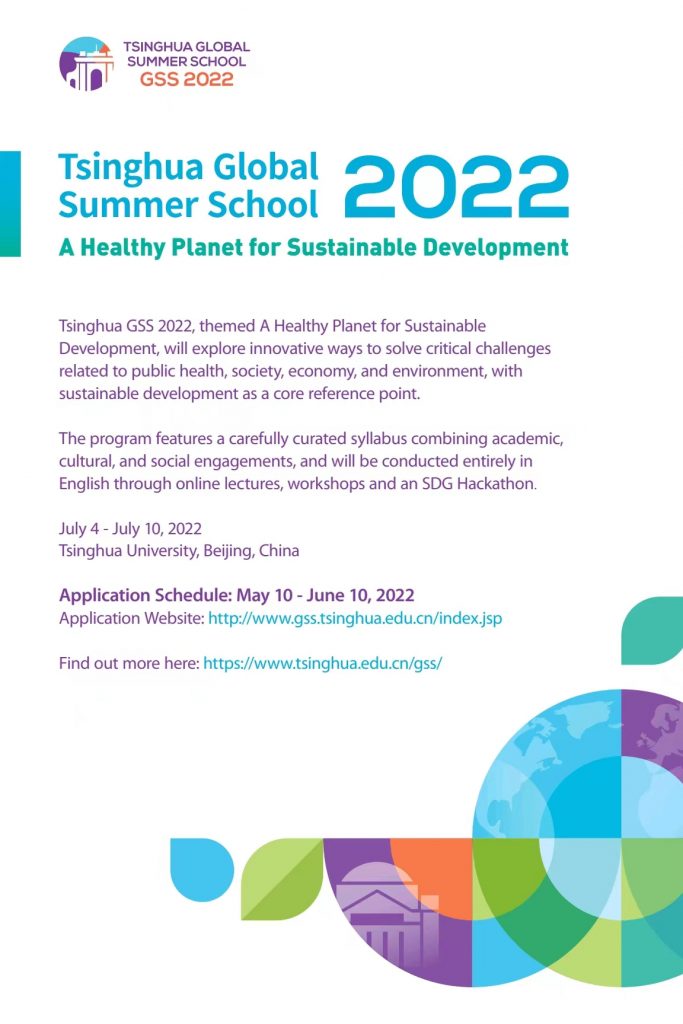
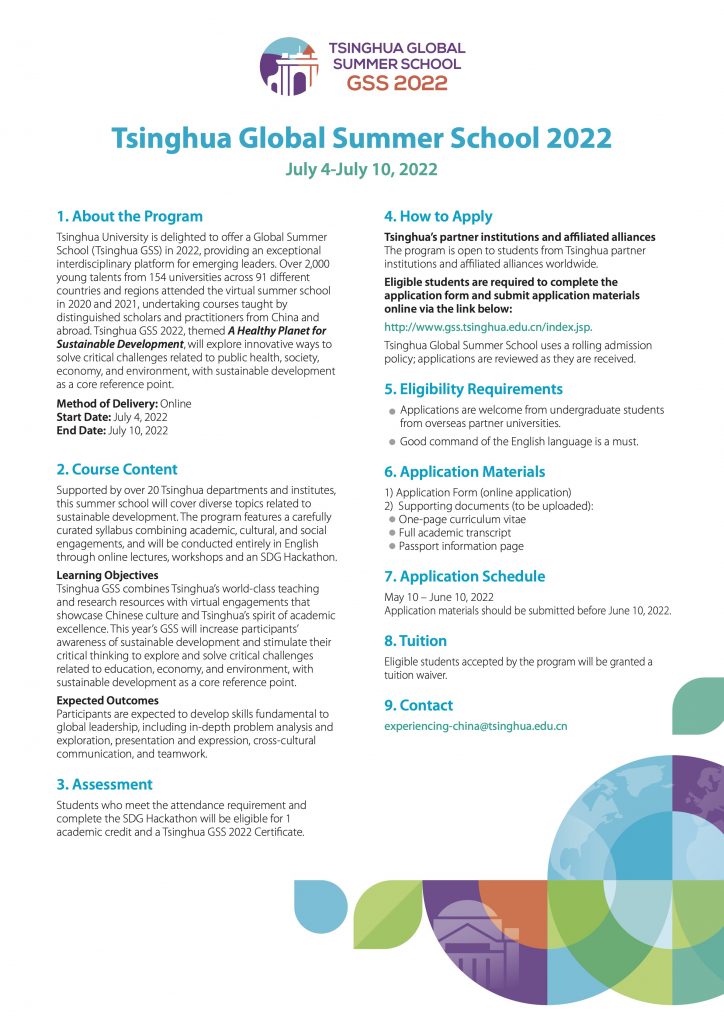
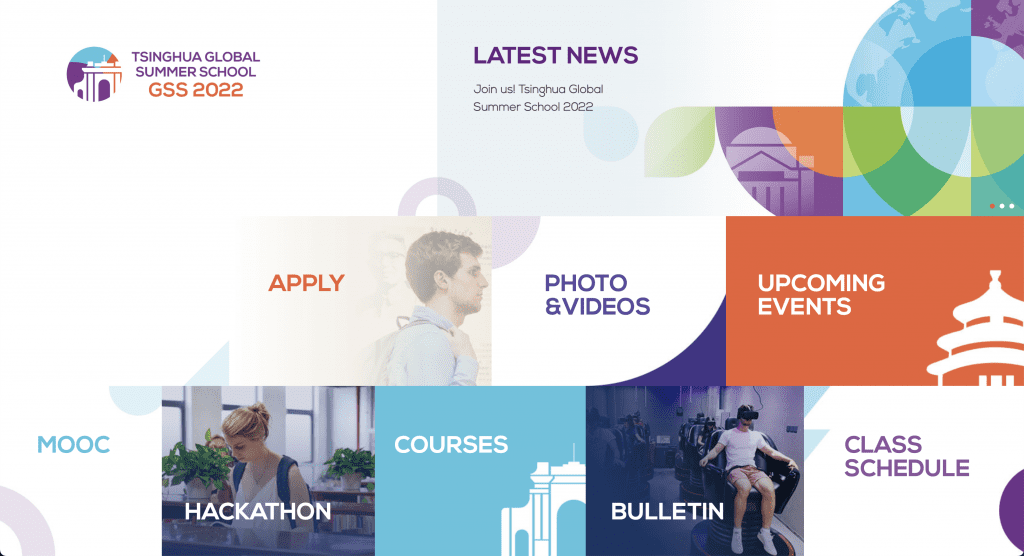
Course Content
Supported by over 20 Tsinghua departments and institutes, this summer school will cover diverse topics related to sustainable development. The program features a carefully curated syllabus combining academic, cultural, and social engagements, and will be conducted entirely in English through online lectures, workshops, and an SDG Hackathon.
Learning Objectives
Tsinghua GSS combines Tsinghua’s world-class teaching and research resources with virtual engagements that showcase Chinese culture and Tsinghua’s spirit of academic excellence. This year’s GSS will increase participants’ awareness of sustainable development and stimulate their critical thinking to explore and solve critical challenges related to education, economy, and environment, with sustainable development as a core reference point.
Expected Outcomes
Participants are expected to develop skills fundamental to global leadership, including in-depth problem analysis and exploration, presentation and expression, cross-cultural communication, and teamwork.
Assessment
Students who meet the attendance requirement and complete the SDG Hackathon will be eligible for 1 academic credit and a Tsinghua GSS 2022 Certificate.
How to apply
Tsinghua’s partner institutions and affiliated alliances
The program is open to students from Tsinghua partner institutions and affiliated alliances worldwide.
Eligible students are required to complete the application form and submit application materials online via: http://www.gss.tsinghua.edu.cn/
Tsinghua Global Summer School uses a rolling admission policy; applications are reviewed as they are received.
Eligibility Requirements
- Applications from undergraduate students from overseas partner universities.
- Good command of the English language is a must.
Application Materials
- Application Form (online application)
- Supporting documents (to be uploaded):
- One-page CV
- Full academic transcript
- Passport information page
Application Schedule
May 10 – June 10, 2022
Application materials should be submitted before June 10, 2022.
Tuition
Free. Eligible students accepted by the program will be granted a tuition waiver.
Contact
experiencing-china@tdytsinghua-edu-cn
